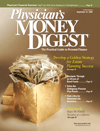Publication
Article
Physician's Money Digest
Get All the Facts on the Rich Man's Tax
Author(s):
Don't think you're vulnerable to the rich man'stax? Think again. The dreaded alternativeminimum tax (AMT) may soon be coming toa tax return near you—perhaps even yourown. But don't wait until next spring to find out whetheryou're subject to the AMT.
Vulnerable Conditions
If you live in a high-tax state, have large capitalgains, exercise certain stock options, pay a lot in investmentfees, itemize employee business expenses, and happento have a large family—among other things—youmay soon be subject to the AMT.
The concept:
A complicated parallel tax system, the AMT wasoriginally designed by Congress to ensure that the ultra-wealthydidn't escape paying regular income taxesthrough extensive deductions. Taxpayerscalculate their taxes the regular way and then recalculatethem under the AMT, adding back certain deductionsand adjustments. The calculation method that producesthe highest tax bill is the one the taxpayer must use.
For years, the AMT hit mostly higher-income taxpayers,but things have changed. That's becauseCongress hasn't adjusted the tax for inflation andother factors. Also, by lowering ordinary income taxrates vs AMT rates, recent tax acts have subjectedmore people to the AMT.
By 2010, the Tax Policy Center (www.taxpolicycenter.org) estimates that one of every three taxpayersmay pay the AMT instead of the regular income tax,and nearly one in four households earningbetween $50,000 and $75,000 will pay theAMT. In addition, the Congressional BudgetOffice (www.cbo.gov) estimates that by2010, 90% of married taxpayers withannual incomes between $100,000 and$500,000 will pay the AMT.
Nondeductible Items
What can you do to escape or minimizethe AMT? The important thingis to sit down with your financialadvisor now and identify where you are vulnerableand what actions you can take. Don't fail tocalculate your AMT. If you do, you could get dingedwith interest and penalties. Knowing what you can'tdeduct is helpful when it comes to the AMT. Followingis a list of the most common items you can't deductunder this tax:
- State income or property taxes. This hits taxpayersliving in high-tax states the hardest. Adjusting the timingof your payments may help, but there's little you can do.
- Interest from private-purpose municipal bonds.These include municipal bonds that finance airports,sports stadiums, and industrial development zones.
- Tax-exempt money market and high-yield municipalbond funds. These two funds often hold relativelylarge positions in securities that are subject to the AMT.
- Personal exemptions. The exemptions you take foryourself, your spouse, and your dependent children arenot allowed under the AMT.
- Part of the interest on a home equity loan. Youcan deduct the interest on a home equity loan underthe AMT, but only the portion used to improve yourhome. The interest portion used to pay forsuch things as college or other consumer debtsisn't deductible.
- Miscellaneous itemized deductionssubject to the 2% floor. This category includesnonreimbursed employee business expenses,various investment expense deductions, casualtylosses, and tax preparation fees.
If you think you might be subject to the AMTthis year but not next year, consider acceleratingincome and deferring deductible expenses. High-incomeretirees who can't avoid the AMT may actually find itbeneficial to accelerate taxable income from their retirementaccounts. That's because the top AMT rate, 28%,is still lower than the top regular income tax rate. Sometaxpayers may be able to use an AMT credit to offsetordinary income taxes in subsequent years, when theydon't pay to pay the AMT.
Bill Staton is chairman of Staton Financial
Advisors LLC, a money management firm.
Contact him to join his free weekly "Dollar-Bill
Club" and receive a no-obligation trial to his
weekly "E-Money Digest." His latest book,
coauthored with his wife Mary Staton, Worry-Free Family Finances (McGraw-Hill; 2003), is
available at www.billstaton.com and at all bookstores. He welcomes
questions or comments at 704-365-2122, via fax at 704-365-1910, or at bill@billstaton.com.
